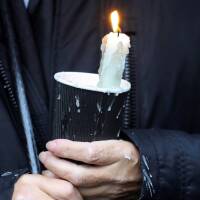Pacific Islands Facing COVID-19 Urged to Fight Climate Change and Inequality as they Reopen
This story was originally published May 21, 2020 by the Thomson Reuters Foundation.
Pacific islands that rely on tourism should reset their economies and invest in sustainable industries and migrant workers to better weather the impact of disease and disaster, according to a senior United Nations official.
Kanni Wignaraja, head of the U.N. Development Programme (UNDP) for Asia-Pacific, urged small Pacific economies that were so hit hard by global travel bans to do things differently when they reopen for business and as overseas labor ventures back.
"Use some of these returning migrant workers to actually set up new lines of business and small and medium scale enterprises," Wignaraja told the Thomson Reuters Foundation. "Otherwise, instead of a wave of tourists coming, you're getting a wave of unemployed workers returning home."

The Pacific islands have had relatively few COVID-19 infections, but have suffered intense economic and social shocks as overseas businesses sent migrant workers home and tourists vanished, said Wignaraja by phone from New York.
She urged island authorities not to see returning migrants as a burden, but instead include them in public works programs and any stimulus spending.
Many migrant workers had already returned to the Pacific islands, where unemployment — particularly among women and young people — was high before the pandemic, according to the U.N.
More on the impact of COVID-19 around the world
The coronavirus has infected more than five million people globally and killed some 320,000, according to a Reuters tally.
Pacific islands such as Fiji, Tonga, Cook Islands and Samoa imposed strict lockdowns to combat the virus; they denied access to supply vessels and banned contact during aircraft refueling.
On top of vanishing tourist income came the devastation wreaked by Cyclone Harold — a Category 5 storm that hit the region last month, cutting power and destroying holiday resorts.
Wignaraja, who is from Sri Lanka and was appointed to her role in December, said Pacific island nations should look at ways to maintain social-distancing while evacuating people or establishing safe zones for people in a natural disaster.
"There is a triple helix, with COVID, natural disasters and high levels of inequality," Wignaraja said. "Tackling any one of these without looking at the three together, would be a real mistake."
As governments around the world unleash unprecedented support for economies floored by the pandemic, Wignaraja said the poorest people should not be forgotten.
In the Pacific, stimulus spending should look at boosting sustainable energy and fishing, and tackling plastic waste that ends up in oceans, she added.
Citing clear skies over many Asian cities during lockdowns — places notorious for air pollution — Wignaraja said fiscal packages must not flow into fossil fuels.
"If not doing it now, when are we going to do this — to switch out of fossil fuels?" she said.
Reporting by Michael Taylor @MickSTaylor; Editing by Lyndsay Griffiths.





